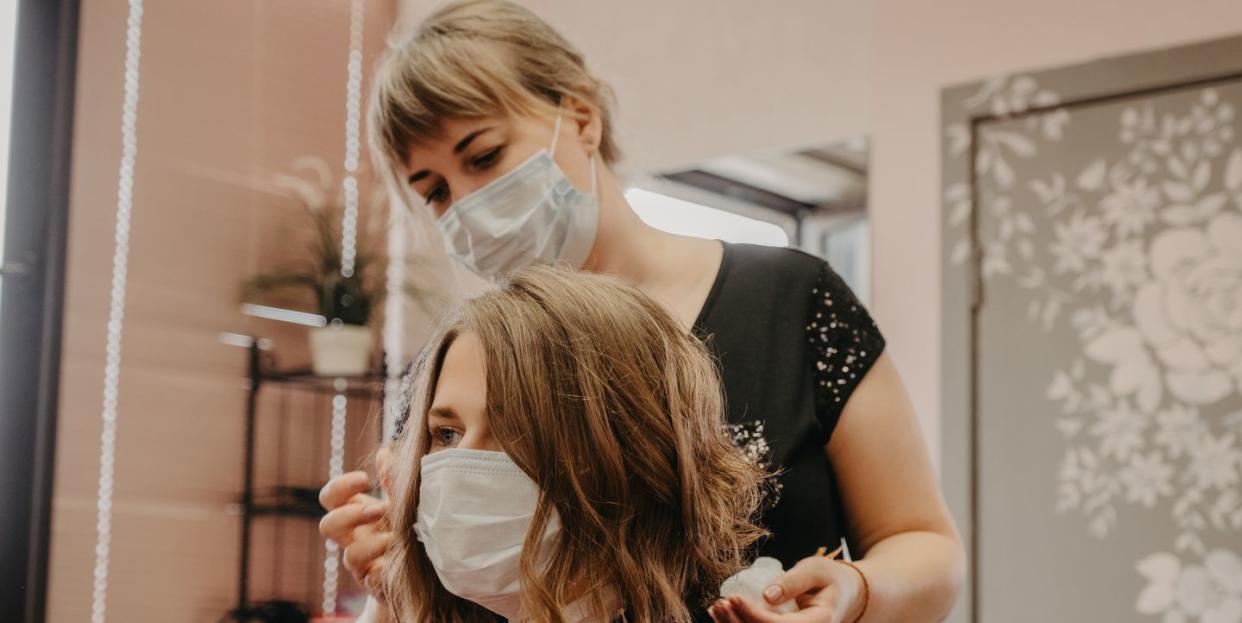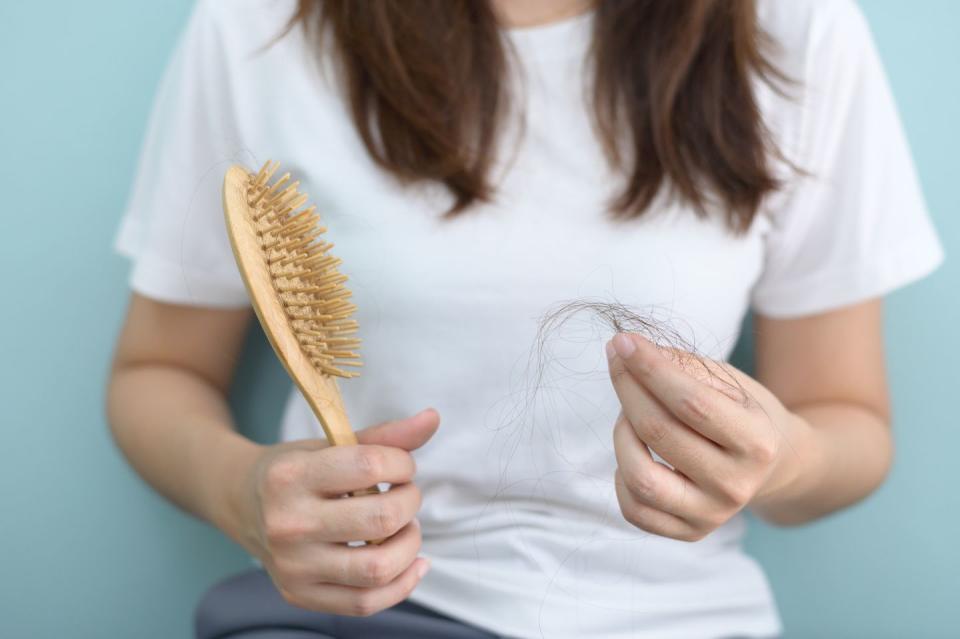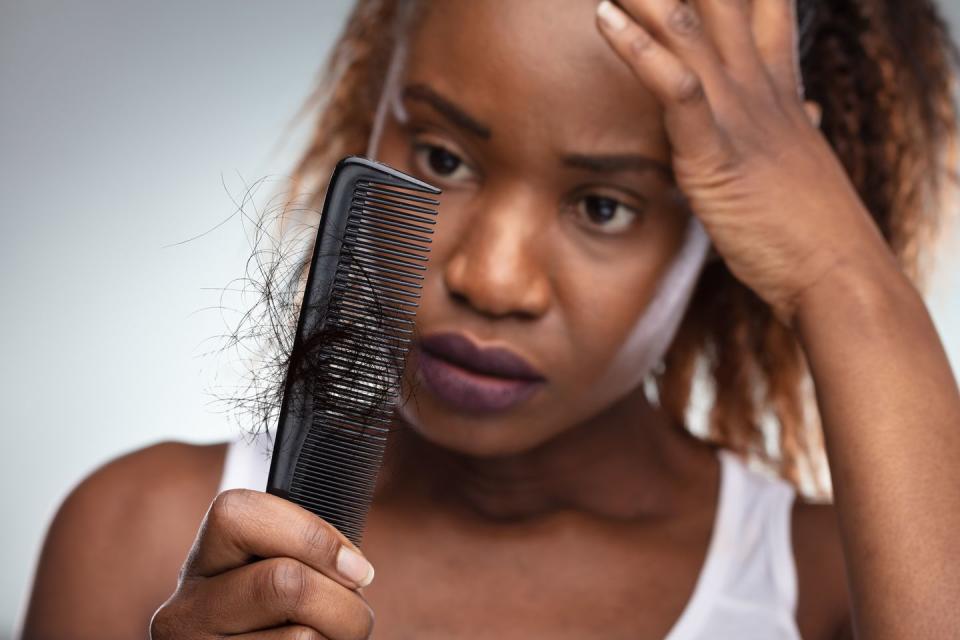More People Are Losing Their Hair This Year Than Ever Before — Here's Why

2020 has been a year filled with anxiety. Whether you're concerned about your health, the health of your family and friends, job security, or how you're going to work from home while facilitating at-home learning, daily life is filled with a slew of stressors and worrisome decisions. So it's no wonder that more people are losing their hair this year than ever before. The stress of the current moment, combined with ore practical details of daily, altered life (for example, wearing your hair pulled back more often) has created a perfect storm for potential or increases hair loss. (There are also physical symptoms from having COVID-19 that can contribute to hair loss, too.)
What typically causes hair loss?
Before understanding what exactly is causing an increase in hair loss this year, it’s important to understand what causes it under "normal" circumstances.
“Possible causes of hair loss range from physical to mental," Dr. Michelle Henry, board-certified dermatologist, tells Woman's Day. "These include genes (androgenetic alopecia), age, autoimmune diseases (alopecia areata), tight hairstyles (traction alopecia) or high levels of stress (telogen effluvium), which includes illness, childbirth, surgery, a stressful life event, or extreme weight loss."

How has COVID-19 increased hair loss this year?
Of course, the era of COVID-19 is anything but "normal," and the virus has presented both physical and mental side effects — whether you contract the novel strain of coronavirus or not.
“Stress levels are at an all-time high this year with the global pandemic impacting every aspect of our lives," Dr. Henry explains. "As a result, more people are experiencing stress-induced hair loss, or telogen effluvium, which is a temporary hair loss condition in which we see excessive hair shedding after some shock to the system.”
Board certified dermatologic surgeon Dr. Dendy Engelman tells Woman's Day that she started seeing an uptick in hair loss patients about four to six weeks after the initial stay-at-home orders in New York City. Dr. Engelman says that “high fevers as well as emotional and physical stressors” will trigger the telogen effluvium she has been observing in patients, and that most patients have lost more than 50 percent of their hair density.
“Most of the patients I’ve seen with hair loss did get quite ill from the virus and had positive COVID test results. They all reported high fevers,” Dr. Engelman says. “Of those who never became ill (negative for COVID and/or antibodies), they did report feeling acutely stressed from the mandated life changes that occurred as a result of the global pandemic including work from home, quarantining alone, quarantining with family, fear of the unknown, etc.”

Is an increase in hair loss permanent?
Whether you have contracted and recovered from COVID-19, are still recovering, or are dealing with COVID-induced stress, it’s important to know that hair loss is normal. And the good news? It should clear up on its own, according to Dr. Engelman.
“It can take four to six months to cycle back to the normal growth phase," she explains. "Once we’ve ruled out other conditions with blood work thyroid function, hormones, iron levels, and micronutrients like zinc and B12 are all normal as well, we can prescribe special shampoos and supplements to help hair stop shedding and start to regrow."
“Whether you are experiencing telogen effluvium because of a sickness or psychological stress, the timeline is the same,” Dr. Belkin says. “Generally it takes three months after the stressful event to start seeing hair loss and it presents itself in the same way.”
How to treat hair loss at home.
In the meantime, there are also ways to keep your hair as healthy and strong as possible at home.
Shab Reslan, a hair health expert at HairClub, tells Woman's Day that a recent HairClub survey revealed that 39 percent of Americans are dealing with hair loss that they feel is induced by COVID in one way or another. And while going to a dermatologist should always be your first move when dealing with sudden hair loss, there are things that can help at home, too.
“Managing stress can be difficult especially when it’s based on a pandemic we were not prepared for,” Reslan says. “Remaining calm through a wellness approach of exercise, eating healthy and natural supplements that can lower inflammation and stress can help us greatly.”
These steps won’t necessarily cure your hair loss, but they certainly won’t hurt, either. And if they make you feel less stressed overall, then that’s just an added benefit.
Dr. Henry agrees that a “nutrient-rich diet,” regular exercise, and meditation are all things that can help reduce stress (and therefore, possibly, hair loss). For other solutions, Dr. Henry suggests avoiding tight hairstyles and heat styling. For another treatment to promote hair growth and retention, she suggests Nioxin 3-Part System Kits “to help achieve and maintain thicker, fuller hair.”
Hair loss can feel frustrating and embarrassing, but if you’re losing your locks this year more than ever before (or for the first time), you should know you’re not alone. If you’re concerned, consider putting some of the above advice into action and never hesitate to see a trusted, board-certified dermatologist for answers.
You Might Also Like

